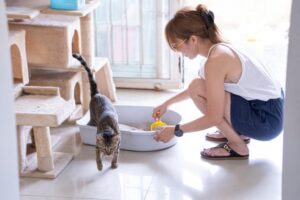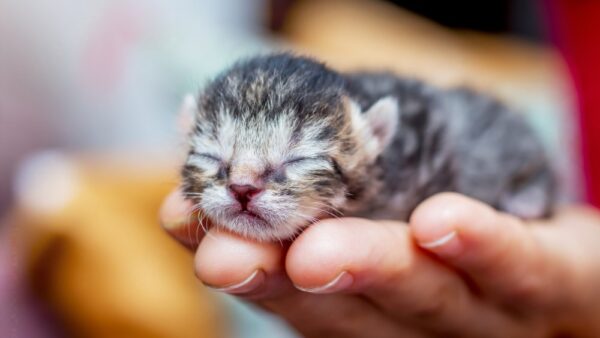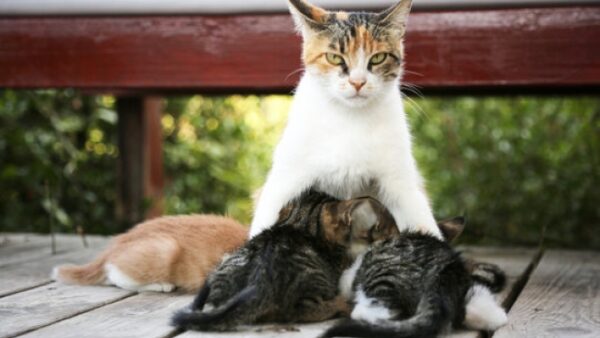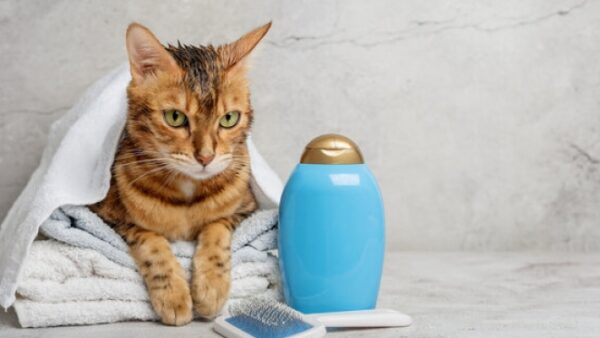“Why is my cat peeing outside the litter box?” This is one of the most asked questions by cat owners. Seeing your litter-trained cat peeing outside the litter box can be frustrating and puzzling.
This inappropriate elimination can be caused by underlying health issues, behavioral issues, or stress and anxiety. Whichever it might be, everything has been explained vividly in this blog post.
It is important to identify the root cause of this behavior and address it promptly because cats are creatures of habit. The longer they eliminate outside the litter box, the longer it takes them to quit.
That being said, everything you need to know about the query “Why is my cat peeing outside the litter box” has been revealed in this blog post. You will also know how to address this issue and when to see a vet.
Without further ado, let’s begin!
Understanding the Causes of Inappropriate Urination

Cat litter box problems can be caused by a variety of reasons, it could be an underlying health issue such as UTI, bladder stones, diabetes, and many more. It could also be caused by behavioral factors such as stress, anxiety, and territoriality.
To make everything completely clear to you, below is an explicit explanation of the causes of inappropriate urination in cats.
Medical Factors
According to Dr. Cathy Lund of City Kitty, “Anything that alters your cat’s health or well-being can cause a behavior change”. This implies that a sickness or illness can make your cat start urinating inappropriately.
If your cat is urinating outside the litter box, the first step you should take is to consult with a vet. They will help rule out any health issue by running a series of scans and tests.
Below is the common health issue that causes inappropriate urination in cats:
Urinary Tract Infections (UTIs)
Urinary tract infections are relatively common in cats and can lead to inappropriate urination. Just like with humans, these infections cause discomfort and a strong urge to urinate.
Your cat may associate the litter box with pain, prompting them to seek alternative spots for relief. Symptoms to watch for include increased frequency of urination, straining, and possibly blood in the urine. A veterinarian can diagnose and treat UTIs with appropriate medications.
Bladder Stones and Blockages
Bladder stones and blockages can obstruct your cat’s urinary tract, making it challenging and painful for them to urinate.
Cats may start avoiding the litter box as they associate it with their discomfort. Signs of this condition may include crying while in the litter box, frequent unsuccessful attempts to urinate, and lethargy. If your cat is diagnosed with bladder stones, vets usually recommend surgical removal of the stones or catheterization to relieve blockages.
Diabetes
Diabetes is another disease that can cause your cat to pee outside the litter box. Diabetes causes excessive thirst in dogs, making it difficult to control their bladder.
Common signs of diabetes in cats include increased drinking, weight loss, and an increased need to urinate. To manage feline diabetes, vets often recommend dietary changes, insulin therapy, and medications.
Degenerative Joint Disease (Osteoarthritis)
Degenerative joint disease, also known as osteoarthritis, can affect cats as they age. When your cat experiences pain or discomfort from joint issues, they may avoid the litter box, especially if it’s challenging for them to climb in and out.
Signs of joint pain in cats can include stiffness, reduced mobility, and difficulty jumping. Veterinary treatment may involve pain management strategies to improve your cat’s comfort and mobility.
Hyperthyroidism
The thyroid gland in cats produces thyroxine, a hormone that regulates metabolism in the body. If this hormone is secreted in excess, it can lead to hyperthyroidism. a condition in which the thyroid gland becomes overactive, leading to various health issues, including changes in urination behavior.
Cats with hyperthyroidism may experience increased appetite, weight loss, restlessness, and frequent urination.
If your cat is diagnosed with hyperthyroidism, your vet may recommend treating it with medication, dietary adjustments, or radioactive iodine therapy.
Behavioral Factors
Cat inappropriate urination is not always caused by an underlying health issue. If after visiting your vet, he ruled out any underlying health issue, it is time to consider potential behavioral causes.
Stress And Anxiety Triggers
Cats are very sensitive creatures, and they respond to even the slightest change in their environment. Moving their litter box to a new location, changing their litter box, adding a new cat or pet into the family, and playing music or loud sounds are all changes that can affect cats substantially.
According to Dr. Lund, “A cat experiencing anxiety may urinate outside the litter box to relieve their anxiety because the scent of their urine makes them feel safer”.
If your cat’s inappropriate urination starts after making any of these changes in your home, it is likely caused by stress or anxiety. In this case, provide a safe and more comfortable environment free from stress for your cat. You should also ensure that the new pet in the family doesn’t have access to the cat’s room.
Territory Marking and Scent Communication
Aside from stress and anxiety, territoriality is another behavioral factor that can make your cat urinate outside the litter box.
Cats are territorial and they mark their territory by spraying their pee in a location. If an outdoor cat is lingering around in your yard, or if you just bring a new cat into the family. Your cat may want to spray his pee in a specific place in your house. This is to signal the new cat that Hey! Newbie, this place belongs to me, so keep off.
Dirty Litter Box
Even in humans, nobody would love to use a toilet while it’s dirty. This also applies to cats. If you fail to clean up your cat’s litter regularly. The lingering smell of pee and poop would repel your cat and make him find somewhere else to do his business.
Veterinarians advise scooping your cat’s litter box at least twice a day and cleaning it thoroughly with scent-free detergent at least once a week.
A Hard-to-reach Litter Box
Aside from a dirty litter box, a box placed in an uncomfortable location could cause a cat to go pee elsewhere.
The litter box should be placed in active areas of the house. You may consider placing it in a nearby hallway, office, or bathroom.
Ensure your cat has easy accessibility to the litter box and avoid placing it near noisy appliances like washing machines, dryers, or furnaces. Cats can be sensitive to noise and may be deterred from using the litter box in such conditions.
Solutions to your Cat’s Litter Box Problems

To stop your cat from peeing outside the litter box, consider applying any of these solutions:
Visit a Vet
The first thing you would want to do after noticing that your cat is peeing outside the litter box is to consult with a veterinarian.
Cat inappropriate peeing problem might sound or look harmless, but it is far more than that, as this issue is often linked to underlying health issues such as Urinary Tract Infections, Kidney stones, diabetes, and many more.
Hence, visit a qualified vet. He will help examine your cat and rule out any underlying health issues.
Identify And Address Stressors in The Environment
If your cat’s inappropriate urination is not caused by health issues, then it is time to check for stressors in his environment.
Stressors such as loud noise, other pets in the house, and outdoor cats in your yard can all exacerbate stress in your cats, leading to peeing outside the box.
If you notice that your cat litter box problem is caused by stressors, try to create a safer and calmer environment for your feline.
Provide Multiple Litter Boxes and Place Them in Strategic Locations
By providing your cat with multiple litter boxes, you have provided him with convenience and accessible options for elimination.
Cats can be territorial, and having more than one litter box reduces competition and the risk of accidents.
These litter boxes should be placed in strategic locations where your cats can have easy access. Avoid placing them in noisy areas or areas where other pets are present. Instead, place the boxes in places where your cat doesn’t have to travel too far to find them.
Regular Litter Box Maintenance
Cats do not like using a dirty litter box. Hence, always scoop the litter box at least twice a day and wash it thoroughly with non-scented detergent at least once a week.
Create A Stimulating and Stress-Free Living Space
Cats often use inappropriate elimination as a way to communicate their distress. To stop this, all you need to do is to create a more comfortable environment for your cat.
A well-designed, stress-free living space provides mental and physical stimulation for cats, and it will also make them less likely to exhibit unwanted behaviors such as peeing outside of the litter box.
Introduce Positive Reinforcement and Retraining Techniques
If after trying any of the techniques above, your cat still pees outside the litter box, then you have to seek the help of a professional cat behaviorist.
They might have to retrain your cat on how to effectively use the litter box.
Conclusion
Why is my cat peeing outside the litter box? There is no specific answer to this question as there are different reasons that can cause your cat to pee outside the litter box. It could be as a result of stress or anxiety, underlying health issues like UTI, diabetes, dirty litter box, or territorial marking.
The first thing you should do after noticing that your cat is peeing outside the litter box is to visit a vet. This will help clear the doubt that your cat litter box problem is caused by an underlying health issue.
If your cat’s health checks out, you may have to consider assessing the litter box, is it clean or dirty? Is the box big enough to occupy your feline? Is the box placed in a comfortable location? If there is nothing wrong with the litter box, then it’s time to consult with a cat behaviorist.
A cat behaviorist will help litter train your cat and make it see the need to always go to the litter box for anything it wants to pee.
Before you go, you can also read: Why does my cat’s fur looks separated?







Leave a comment